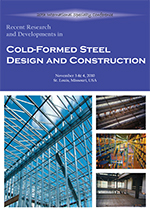Session Dates
03 Nov 2010
Abstract
The US Rack Manufacturers Institution (RMI) code uses a theoretical formula derived by Timoshenko and the new Eurocode EN15512 requires testing. There is a considerable difference in the stiffn ess values determined by two approaches. This paper describes the experiments conducted on 80 full sized upright frames at Oxford Brookes University varying upright size, number of panels in the frame, aspect ratio of the panel (panel length/depth), restraints at the intermediate nodes of the frame, loading pattern, lacing pattern (channels back to back or front to front) and bolt tightness. The experimental data reported can be used in proposing revised design procedures.
Department(s)
Civil, Architectural and Environmental Engineering
Research Center/Lab(s)
Wei-Wen Yu Center for Cold-Formed Steel Structures
Meeting Name
20th International Specialty Conference on Cold-Formed Steel Structures
Publisher
Missouri University of Science and Technology
Document Version
Final Version
Rights
© 2010 Missouri University of Science and Technology, All rights reserved.
Document Type
Article - Conference proceedings
File Type
text
Language
English
Recommended Citation
Sajja, S. R.; Beale, R. G.; and Godley, M. H. R., "Cross-aisle Stiffness Tests on Rack Upright Frames" (2010). CCFSS Proceedings of International Specialty Conference on Cold-Formed Steel Structures (1971 - 2018). 1.
https://scholarsmine.mst.edu/isccss/20iccfss/20iccfss-session8/1
Cross-aisle Stiffness Tests on Rack Upright Frames
The US Rack Manufacturers Institution (RMI) code uses a theoretical formula derived by Timoshenko and the new Eurocode EN15512 requires testing. There is a considerable difference in the stiffn ess values determined by two approaches. This paper describes the experiments conducted on 80 full sized upright frames at Oxford Brookes University varying upright size, number of panels in the frame, aspect ratio of the panel (panel length/depth), restraints at the intermediate nodes of the frame, loading pattern, lacing pattern (channels back to back or front to front) and bolt tightness. The experimental data reported can be used in proposing revised design procedures.



